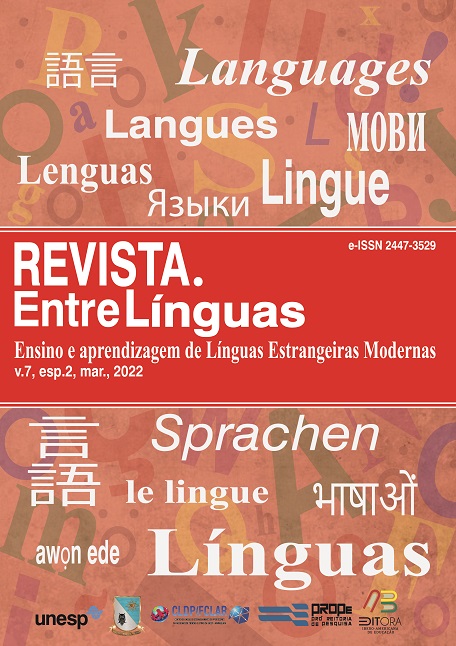Digitalización global y estética lingüística
Textología e identidad lingüística
DOI:
https://doi.org/10.29051/el.v8iesp.2.17314Palabras clave:
Digitalization, Linguo-aesthetics, Artificial intelligence, Philological linguistic personality, Linguistic thinking, Artistic discourse, French, Linguistic image of the worldResumen
El trabajo ofrece una de las vías para resolver el problema en cuestión considerando el impacto filológico y estético en el pensamiento lingüístico del individuo para formar una personalidad lingüística armónicamente desarrollada. En este caso, los parámetros linguoestéticos de los textos son material inagotable para la investigación innovadora. La estética lingüística es una parte integral de la cultura nacional, en particular, la cultura lingüística. En la conciencia colectiva de los hablantes de la lengua nacional, el aspecto estético del texto genera una imagen linguoestética del mundo propia de cada comunidad lingüística. El artículo considera algunos aspectos de la comunicación estética y la imagen literaria del mundo en relación con los factores discursivos de los textos artísticos. La hipótesis de trabajo es que la estética linguo de la lengua francesa tiene un alto grado de actividad linguocultural en el discurso nacional francés moderno y, en consecuencia, en la imagen lingüística del mundo.
Descargas
Citas
BOGOSLOVSKAIA, V. R. Aktivnye protsessy v sportivnoi terminologii sovremennogo russkogo iazyka [Active processes in the sport terminology of the modern Russian language] In: INTERNATIONAL CONFERENCE OF YOUNG SCIENTISTS, 13., 2002. Annals […]. SPb., 2002. Available in: http://www.sovmu.spbu.ru/main/conf/man-nat-soc/2002/4-13.htm. Access in: 12 Apr. 2021.
BORDEAU, J. Le nouveau pouvoir du langage. France: Jeanne Bordeau, 2020.
FILLIPOVA, E. I. Territoriia kollektivnoi identichnosti v sovremennom frantsuzskom diskurse [The terrain of collective identity in contemporary French discourse]: Summary of a doctoral dissertation in history, specialty 07.00.07 – ethnography, ethnology and anthropology. Moscow, 2010.
GERMAN, N. F. Lingvokulturnaia identichnost subekta kommunikatsii [Linguocultural identity of the subject of communication]. Chelyabinsk State University Bulletin, v. 11, n. 149, p. 63–66, 2009.
GRISHAEVA, L. I. Osobennosti ispolzovaniia iazyka i kulturnaia identichnost kommunikantov: Monografiia. [Peculiarities of the use of language and the cultural identity of communicants: monograph.] Voronezh: Voronezh State University, 2007.
KARASIK, V. I. Iazykovoi krug: Lichnost, kontsepty, diskurs. [The language circle: Personality, concepts, discourse.] Volgograd: Peremena, 2002.
KOMOVA, T. A.; GARAGULIA S. I. Iazykovaia lichnost: Ot slova k tekstu: Na materiale angloiazychnogo diskursa. [Linguistic personality: From word to text: On the material of English-language discourse.] Moscow: URSS, 2013.
LIKHACHEV, D. S. Ocherki po filosofii khudozhestvennogo tvorchestva. [Essays on the philosophy of artistic creation.] St. Petersburg: Russian-Baltic Information Center BLITS, 1996.
OGNEVA, E. A. et al. Linguocultural aspects of the discursive synergy. Journal of Language and Literature, v. 6, n. 2, p. 208-211, 2015. Available in: http://dspace.bsu.edu.ru/handle/123456789/14360. Access in: 15 June 2022.
OGNEVA, E. A. Specificity of space landscape language at the fiction conceptsphere. Journal of Language and Literature, v. 5, n. 3, p. 54-58, Aug. 2014. Available in: https://www.researchgate.net/profile/Elena-Ogneva/publication/284395675_Specificity_of_space_landscape_language_units_at_the_fiction_conceptsphere/links/5a9c2ae4a6fdcc3cbacd4b0f/Specificity-of-space-landscape-language-units-at-the-fiction-conceptsphere.pdf. Access in: 03 Apr. 2022.
ORLOVA, O. V. Kompiuternyi analiz poeticheskogo teksta i modelirovanie assotsiativno-smyslovogo polia kliuchevogo kontsepta avtora [Computer analysis of poetic text and modeling of associative and semantic field of the key author’s concept]. Otkrytoe i distantsionnoe obrazovanie. Association of Educational and Scientific Institutions “Siberian Open University”, Tomsk, v. 1, n. 9, p. 60-64, 2003. Available in: https://elibrary.ru/item.asp?id=14804751. Access in: 11 june 2022.
PIERRON, S. Ce beau français un peu individuel: Proust et la langue. Paris: Presses Universitaires de Vincennes, 2005.
POPOVA, N. V. Poniatie lingvokultury kak produkt antropotsentricheskoi paradigmy v lingvistike [The concept of linguoculture as a product of anthropocentric paradigm in linguistics]. Problemy teorii iazyka i perevodovedeniia: sb. statei. Moscow State Regional University, Moscow, n. 27, p. 55-62, 2005.
PROUST, M. À la recherche du temps perdu. Paris: Bibliothèque de la Pléiade, 1988.
PRUVOST, J.; SEDYKH, A. P.; BUZINOVA, L. M. Tekst, kontekst, intertekst: sintez smysloporozhdeniia. Nauchnyi rezultat. Voprosy teoreticheskoj i prikladnoj lingvistiki [Text, context, intertext: synthesis of the generation of meaning. Scientific Result. Theoretical and Applied Linguistics], v. 4, n. 3, p. 21-35, 2018. Available in: http://rrlinguistics.ru/media/linguistics/2018/3/Лингвистика_том4_3_2018.pdf. Access in: 08 Jan. 2022.
SEDYKH, A. P. et al. Toponymic phraseological unit, linguistic thinking and discourse: Russia, France and Italy. Revista inclusions, v. 7, n. esp., p. 488-500, June/Sept. 2020.
SEDYKH, A. P. Kontekst. Znak. Obraz. [Context. Sign. Image.] Belgorod: Belgorod State University, 1998.
VISHNIAKOVA, O. D. Funktsionalno-kognitivnaia paradigma kak sfera kontsentratsii lingvisticheskoi mysli v nastupivshem stoletii [Functional-cognitive paradigm as a sphere of concentration of linguistic thought in the coming century]. Filologicheskie nauki., n. 6, 2003.
ZAIKA, V. I. Ob esteticheskoi realizatsii iazyka [On the aesthetic realization of language]. Vestnik of the Novgorod State University, n. 15, 2000.
Publicado
Cómo citar
Número
Sección
Licencia

Esta obra está bajo una licencia internacional Creative Commons Atribución-NoComercial-CompartirIgual 4.0.
Os manuscritos aceitos e publicados são de propriedade da Revista EntreLínguas. Os artigos publicados e as referências citadas na Revista EntreLínguas são de inteira responsabilidade de seus autores.
Transferência de direitos autorais – autorização para publicação
Caso o artigo submetido seja aprovado para publicação, já fica acordado que o(s) autor(es) autoriza(m) a UNESP a reproduzi-lo e publicá-lo na EntreLínguas, entendendo-se os termos “reprodução” e “publicação” conforme definição respectivamente dos incisos VI e I do artigo 5° da Lei 9610/98. O artigo poderá ser acessado pela rede mundial de computadores (Internet), sendo permitidas, a título gratuito, a consulta e a reprodução de exemplar do artigo para uso próprio de quem a consulta, desde que haja a citação ao texto consultado. Essa autorização de publicação 328 EntreLínguas, Araraquara, v. 1, n .2, p. 323-328, jul./dez. 2015 não tem limitação de tempo, ficando a UNESP responsável pela manutenção da identificação do(s) autor(es) do artigo. Os artigos publicados e as referências citadas na Revista EntreLínguas são de inteira responsabilidade de seus autores.











